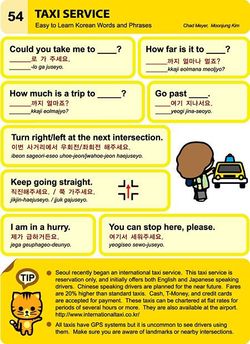Jul 10, 2023
Korean language - 02

Getting Around Korea
Getting Around Korea

Title: Getting Around Korea: Using Taxi Services and Easy-to-Learn Korean Phrases
Title: Getting Around Korea: Using Taxi Services and Easy-to-Learn Korean Phrases
Objectives:
- To familiarize learners with taxi services in Korea
- To teach learners useful Korean phrases for taking a taxi
- To encourage learners to use taxis safely and effectively
Materials:
- Whiteboard or chalkboard and markers/chalk
- Handouts with Korean phrases and English translations
- Audio recordings or videos of native Korean speakers pronouncing the phrases
- Internet access for researching taxi services in Korea
Introduction (10 minutes):
- Ask learners if they have ever taken a taxi before and where they took it
- Discuss the advantages and disadvantages of taking a taxi compared to other modes of transportation
- Introduce the topic of taxi services in Korea and explain that Korean taxis are generally safe and reliable
Body (40 minutes):
- Explain that there are different types of taxis in Korea, including regular taxis, deluxe taxis, and international taxis
- Show learners the website for the international taxi service in Korea and explain that this service is reservation-only and offers drivers who speak English and Japanese (and soon, Chinese)
- Discuss the fare rates for taxis in Korea and explain that fares are generally metered, but it is always a good idea to confirm the fare with the driver before starting the trip
- Introduce the easy-to-learn Korean phrases listed below, along with their English translations
- Use audio recordings or videos to demonstrate the pronunciation of each phrase
- Write each phrase on the board and go over the pronunciation and meaning of each one
- Ask learners to practice saying the phrases in pairs or small groups, and provide feedback on their pronunciation
Easy-to-Learn Korean Phrases:
1. Could you take me to __ 로 가 주세요? (lo ga juseyo) - "Could you take me to __?"
2. How much is a trip to __ 까지 얼마죠? (kkaji eolmajyo?) - "How much is a trip to __?"
3. How far is it to __ 까지 얼마나 멀죠? (kkaji eolmana meoljyo?) - "How far is it to __?"
4. Go past here. 여기 지나서요. (yeogi jina-seoyo)
5. Turn right/left at the next intersection. 이번 사거리에서 우회전/좌회전 해주세요. (ibeon sageori-eseo uhoe-jeon/jwahoe-jeon haejuseyo)
6. Keep going straight. 직진해주세요. / 쭉 가주세요. (jikjin-haejuseyo./jjuk gajuseyo)
7. I am in a hurry. 제가 급하거든요. (jega geuphageo-deunyo)
8. You can stop here, please. 여기서 세워주세요. (yeogiseo sewo-juseyo)
Conclusion (10 minutes):
- Review the international taxi service and the easy-to-learn Korean phrases for taking a taxi
- Encourage learners to try taking a taxi in Korea using the phrases they learned today
- Provide additional resources for learners who want to learn more Korean, such as language learning apps or online courses
Assessment:
- Observe learners as they practice saying the easy-to-learn Korean phrases and provide feedback on their pronunciation
- Ask learners to write a short paragraph about their experience taking a taxi in Korea, using at least three of the Korean phrases they learned in class, along with their English translations
Lost in Translation: How Easy-to-Learn Korean Phrases and International Taxis Saved the Day in Seoul
Lost in Translation Story:
How Easy-to-Learn Korean Phrases and International Taxis Saved the Day in Seoul.
01**
Ji-hye was running late for her job interview, and she knew that she had to hurry if she wanted to make it on time. She decided to take a taxi to the company's office, but she was worried because she didn't speak Korean very well.
As she hailed a taxi, she remembered some of the easy-to-learn Korean phrases she had studied the night before. She asked the driver, "Could you take me to the company's office? (회사 사무실로 가 주세요?). The driver nodded and responded, "Sure, hop in (네, 들어오세요)."
Ji-hye then asked, "How much is a trip to the company's office? (회사 사무실까지 얼마죠?)." The driver replied, "It will be about 20,000 won (2만원 정도입니다)."
02**
Ji-hye was also worried about the distance to the office, so she asked, "How far is it to the company's office? (회사 사무실까지 얼마나 멀죠?)." The driver said, "It's about 10 kilometers away (10km 정도 떨어져 있습니다)."
As the taxi progressed, Ji-hye noticed that they were passing some familiar landmarks. She asked the driver to go past the office and drop her off at the next intersection (여기 지나서요). The driver complied and asked, "Do you want to turn right or left at the next intersection? (다음 사거리에서 우회전/좌회전 해주세요)." Ji-hye replied, "Please turn right (우회전 해주세요)."
03**
The driver turned right, and Ji-hye asked him to keep going straight (직진해주세요). She also told him, "I am in a hurry (제가 급하거든요)."
Finally, they arrived near the company's office, and Ji-hye asked the driver to stop the taxi (여기서 세워주세요). She paid the driver with her T-Money card and thanked him in Korean (감사합니다).
Ji-hye was relieved that she had made it to her interview on time, thanks to the easy-to-learn Korean phrases and the reliable international taxi service in Seoul.
04**
After her interview, Ji-hye received a call from the company that they were impressed with her skills and qualifications. She was excited to hear the news and was grateful that she made it on time for her interview. She decided to treat herself to a nice meal to celebrate.
As she was looking for a restaurant, she saw a group of tourists trying to communicate with a taxi driver. She approached them and asked if they needed help. They explained that they wanted to go to a nearby tourist attraction, but they were having trouble communicating with the driver.
05**
Ji-hye remembered her experience earlier in the day and offered to help. She asked the driver in Korean, "Could you take them to the tourist attraction? (관광지로 가 주세요)." The driver nodded, and Ji-hye turned to the tourists and asked, "Where do you want to go? (어디로 가시려나요?)." They replied with the name of the attraction, and Ji-hye asked the driver, "How much is a trip to the tourist attraction? (관광지까지 얼마죠?)." The driver replied, "It will be about 30,000 won (3만원 정도입니다)."
Ji-hye then told the driver to go past the attraction and drop them off at the next intersection, and turn left (여기 지나서 좌회전 해주세요). She also reminded the tourists to pay attention to landmarks or nearby intersections for their return trip.
06**
The tourists were grateful for Ji-hye's help, and they thanked her before getting into the taxi. Ji-hye smiled and waved goodbye as the taxi drove away.
Ji-hye felt proud of herself for helping the tourists and using her newly learned Korean phrases. She realized that learning a few simple phrases can make a big difference when traveling in a foreign country.
From that day on, Ji-hye made it a point to practice her Korean and learn new phrases every day. She also continued to use the international taxi service in Seoul whenever she needed to get to her destination quickly and safely.
Important vocabulary:
Important vocabulary:
1. 체크인 (chekeu-in) - check-in
2. 수하물 (suha-mul) - luggage, baggage
3. 탑승구 (tapseung-gu) - boarding gate
4. 탑승권 (tapseung-gwon) - boarding pass
5. 출발 (chul-bal) - departure
6. 도착 (do-chak) - arrival
7. 항공권 (hang-gong-gwon) - airline ticket
8. 승무원 (seung-mu-won) - flight attendant
9. 기내식 (gi-nae-sik) - in-flight meal
10. 비행기 (bi-haeng-gi) - airplane
11. 로 가 주세요 (lo ga juseyo) - Could you take me to...?
12. 까지 얼마죠 (kkaji eolmajyo?) - How much is it to...?
13. 까지 얼마나 멀죠 (kkaji eolmana meoljyo?) - How far is it to...?
14. 여기 지나서요 (yeogi jina-seoyo) - Go past here.
15. 우회전/좌회전 해주세요 (uhoe-jeon/jwahoe-jeon haejuseyo) - Turn right/left at the next intersection.
16. 직진해주세요/쭉 가주세요 (jikjin-haejuseyo/jjuk gajuseyo) - Keep going straight.
17. 제가 급하거든요 (jega geuphageo-deunyo) - I am in a hurry.
18. 여기서 세워주세요 (yeogiseo sewo-juseyo) - You can stop here, please.
19. 회사 사무실 (hwe-sa sa-mu-sil) - Company office
20. 감사합니다 (gam-sa-ham-ni-da) - Thank you
21. 관광지 (gwan-gwang-ji) - Tourist attraction
22. 들어오세요 (deul-eo-o-se-yo) - Hop in
23. 다음 사거리 (da-eum sa-geo-ri) - Next intersection
24. 네, 들어오세요 (ne, deul-eo-o-se-yo) - Yes, please come in.
25. 2만원 정도입니다 (i-man-won jeong-do-im-ni-da) - It will be about 20,000 won.
26. 10km 정도 떨어져 있습니다 (ship-kil-o jeong-do tteol-eo-jyeo it-seum-ni-da) - It is about 10 kilometers away.
27. 어디로 가시려나요? (eo-di-ro ga-si-ryeo-na-yo?) - Where do you want to go?
28. 3만원 정도입니다 (sam-man-won jeong-do-im-ni-da) - It will be about 30,000 won.
29. 관광지까지 얼마죠? (gwan-gwang-ji-kkaji eolmajyo?) - How much is it to the tourist attraction?
30. 간단한 (gan-dan-han) - simple, easy
31. 예약 (ye-yaek) - reservation, booking
32. 영어 (yeong-eo) - English
33. 일본어 (il-bon-eo) - Japanese
34. 중국어 (jung-guk-eo) - Chinese
35. 요금 (yo-geum) - fare, fee
36. 현금 (hyeon-geum) - cash
37. 신용카드 (sin-yong-ka-deu) - credit card
38. 고정요금 (go-jeong-yo-geum) - flat rate
39. 공항 (gong-hang) - airport
40. GPS 시스템 (GPS si-seu-tem) - GPS system
41. 랜드마크 (raen-deu-maek) - landmark
42. 근처 (geun-cheo) - nearby
43. 해외여행 (hae-oe-yeo-haeng) - overseas travel
44. 기숙사 (gi-suk-sa) - dormitory
45. 주택 (ju-taek) - house,residence
46. 호텔 (ho-tel) - hotel
47. 모텔 (mo-tel) - motel
48. 에어컨 (e-eo-keon) - air conditioner
49. 냉장고 (naeng-jang-go) - refrigerator
50. 전화 (jeon-hwa) - phone, telephone
51. 인터넷 (in-teo-net) - internet
52. 무선 인터넷 (mu-seon in-teo-net) - wireless internet
53. 부킹 취소 (bu-king chwi-so) - booking cancelation
54. 예약 확인 (ye-yaek hwa-yeong) - reservation confirmation
55. 체크아웃 (chekeu-aut) - check-out
56. 수영장 (su-yeong-jang) - swimming pool
57. 사우나 (sa-u-na) - sauna
58. 피트니스 센터 (pi-teu-ni-seu sen-teo) - fitness center
59. 룸서비스 (rum-seo-bi-seu) - room service
60. 무료 와이파이 (mu-ryo wa-i-pa-i) - free Wi-Fi
61. 비즈니스 센터 (bi-jeu-ni-seu sen-teo) - business center
62. 주차장 (ju-cha-jang) - parking lot
63. 렌터카 (ren-teo-ka) - rental car
64. 택시 (taek-si) - taxi
65. 지하철 (ji-ha-cheol) - subway
66. 버스 (beo-seu) - bus
67. 철도 (cheol-do) - train
68. 여권 (yeo-gwon) - passport
69. 비자 (bi-ja) - visa
70. 관광 비자 (gwan-gwang bi-ja) - tourist visa
71. 출입국 카드 (chul-ib-guk ka-deu) - entry/exit card
72. 세관 심사 (se-gwan sim-sa) - customs inspection
73. 수화물 심사 (su-hwa-mul sim-sa) - baggage inspection
74. 선반 (seon-ban) - shelf
75. 옷장 (ot-jang) - wardrobe, closet
76. 침대 (chim-dae) - bed
77. 이불 (i-bul) - blanket, quilt
78. 베개 (be-ge) - pillow
79. 수건 (su-geon) - towel
80. 비누 (bi-nu) - soap
81. 샴푸 (syam-pu) - shampoo
82. 컨디셔너 (keon-di-syeo-neo) - conditioner
83. 칫솔 (chit-sol) - toothbrush
84. 치약 (chi-yak) - toothpaste
85. 면봉 (myeon-bong) - cotton swab
86. 드라이기 (deu-rai-gi) - hair dryer
87. 빨래 (ppal-lae) - laundry
88. 다림질 (da-rim-jil) - ironing
89. 청소 (cheong-so) - cleaning
90. 보관장소 (bo-gwan-jang-so) - storage place
91. 교통카드 (gyo-tong-ka-deu) - transportation card
92. 지하철 노선도 (ji-ha-cheol no-seon-do) - subway map
93. 버스 노선도 (beo-seu no-seon-do) - bus map
94. 건물 (geon-mul) - building
95. 지도 (ji-do) - map
96. 여행 일정 (yeo-haeng il-jeong) - travel itinerary
97. 여행 가이드북 (yeo-haeng ga-ideu-buk) - travel guidebook
98. 여행자 보험 (yeo-haeng-ja bo-heom) - travel insurance
99. 여행 가방 (yeo-haeng ga-bang) - travel bag
100. 여행 카메라 (yeo-haeng ka-me-ra) - travel camera
By undefined
6 notes ・ 16 views
Korean
Elementary